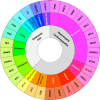This is a preprint.
ClinGen Hereditary Cardiovascular Disease Gene Curation Expert Panel: Reappraisal of Genes associated with Hypertrophic Cardiomyopathy
- PMID: 39132495
- PMCID: PMC11312670
- DOI: 10.1101/2024.07.29.24311195
ClinGen Hereditary Cardiovascular Disease Gene Curation Expert Panel: Reappraisal of Genes associated with Hypertrophic Cardiomyopathy
Update in
-
Genes Associated With Hypertrophic Cardiomyopathy: A Reappraisal by the ClinGen Hereditary Cardiovascular Disease Gene Curation Expert Panel.J Am Coll Cardiol. 2025 Feb 25;85(7):727-740. doi: 10.1016/j.jacc.2024.12.010. J Am Coll Cardiol. 2025. PMID: 39971408 Free PMC article.
Abstract
Background: Hypertrophic cardiomyopathy (HCM) is an inherited cardiac condition affecting ~1 in 500 and exhibits marked genetic heterogeneity. Previously published in 2019, 57 HCM-associated genes were curated providing the first systematic evaluation of gene-disease validity. Here we report work by the ClinGen Hereditary Cardiovascular Disorders Gene Curation Expert Panel (HCVD-GCEP) to reappraise the clinical validity of previously curated and new putative HCM genes.
Methods: The ClinGen systematic gene curation framework was used to re-classify the gene-disease relationships for HCM and related syndromic entities involving left ventricular hypertrophy. Genes previously curated were included if their classification was not definitive, and if the time since curation was >2-3 years. New genes with literature assertions for HCM were included for initial evaluation. Existing genes were curated for new inheritance patterns where evidence existed. Curations were presented on twice monthly calls, with the HCVD-GCEP composed of 29 individuals from 21 institutions across 6 countries.
Results: Thirty-one genes were re-curated and an additional 5 new potential HCM-associated genes were curated. Among the re-curated genes, 17 (55%) genes changed classification: 1 limited and 4 disputed (from no known disease relationship), 9 disputed (from limited), and 3 definitive (from moderate). Among these, 3 (10%) genes had a clinically relevant upgrade, including TNNC1, a 9th sarcomere gene with definitive HCM association. With new evidence, two genes were curated for multiple inheritance patterns (TRIM63, disputed for autosomal dominant but moderate for autosomal recessive; ALPK3, strong for autosomal dominant and definitive for recessive). CSRP3 was curated for a semi-dominant mode of inheritance (definitive). Nine (29%) genes were downgraded to disputed, further discouraging clinical reporting of variants in these genes. Five genes recently reported to cause HCM were curated: RPS6KB1 and RBM20 (limited), KLHL24 and MT-TI (moderate), and FHOD3 (definitive).
Conclusions: We report 29 genes with definitive, strong or moderate evidence of causation for HCM or isolated LVH, including sarcomere, sarcomere-associated and syndromic conditions.
Conflict of interest statement
COMPETING INTERESTS EMM is an advisor to Amgen, Cytokinetics, PepGen, and Tenaya, and is a founder of Ikaika Therapeutics. JW has consulted for MyoKardia, Inc., Pfizer, Foresite Labs, Health Lumen, and Tenaya Therapeutics, and receives research support from Bristol Myers-Squibb. JI receives research grant support from Bristol Myers Squibb unrelated to this work. All other authors declare no competing interests.
Figures



References
-
- Ommen SR, Ho CY, Asif IM, Balaji S, Burke MA, Day SM, Dearani J, Epps KC, Evanovich L, Ferrari VA, Joglar JA, Khan SS, Kim JK, Kittleson MM, Krittanawong C, Martinez MW, Mital S, Naidu S, Saberi S, Semsarian C, Times S, Waldman CB. 2024 AHA/ACC/AMSSM/HRS/PACES/SCMR Guideline for the Management of Hypertrophic Cardiomyopathy: A report of the American Heart Association/American College of Cardiology Joint Committee on Clinical Practice Guidelines. Circulation. 2024;e1239–e1311. - PubMed
-
- Arbelo E, Protonotarios A, Gimeno JR, Arbustini E, Barriales-Villa R, Basso C, Bezzina CR, Biagini E, Blom NA, de Boer RA, De Winter T, Elliott PM, Flather M, Garcia-Pavia P, Haugaa KH, Ingles J, Jurcut RO, Klaassen S, Limongelli G, Loeys B, Mogensen J, Olivotto I, Pantazis A, Sharma S, Van Tintelen JP, Ware JS, Kaski JP, ESC Scientific Document Group. 2023 ESC Guidelines for the management of cardiomyopathies. Eur Heart J. 2023;ehad194. - PubMed
-
- McGurk KA, Zhang X, Theotokis P, Thomson K, Harper A, Buchan RJ, Mazaika E, Ormondroyd E, Wright WT, Macaya D, Pua CJ, Funke B, MacArthur DG, Prasad SK, Cook SA, Allouba M, Aguib Y, Yacoub MH, O’Regan DP, Barton PJR, Watkins H, Bottolo L, Ware JS. The penetrance of rare variants in cardiomyopathy-associated genes: A cross-sectional approach to estimating penetrance for secondary findings. Am J Hum Genet. 2023;110:1482–1495. - PMC - PubMed
-
- Wilde AAM, Semsarian C, Márquez MF, Sepehri Shamloo A, Ackerman MJ, Ashley EA, Sternick EB, Barajas-Martinez H, Behr ER, Bezzina CR, Breckpot J, Charron P, Chockalingam P, Crotti L, Gollob MH, Lubitz S, Makita N, Ohno S, Ortiz-Genga M, Sacilotto L, Schulze-Bahr E, Shimizu W, Sotoodehnia N, Tadros R, Ware JS, Winlaw DS, Kaufman ES, Document Reviewers, Aiba T, Bollmann A, Choi J-I, Dalal A, Darrieux F, Giudicessi J, Guerchicoff M, Hong K, Krahn AD, MacIntyre C, Mackall JA, Mont L, Napolitano C, Ochoa JP, Peichl P, Pereira AC, Schwartz PJ, Skinner J, Stellbrink C, Tfelt-Hansen J, Deneke T. European Heart Rhythm Association (EHRA)/Heart Rhythm Society (HRS)/Asia Pacific Heart Rhythm Society (APHRS)/Latin American Heart Rhythm Society (LAHRS) Expert Consensus Statement on the State of Genetic Testing for Cardiac Diseases. Heart Rhythm. 2022;19:e1–e60. - PubMed
-
- Tuohy CV, Kaul S, Song HK, Nazer B, Heitner SB. Hypertrophic cardiomyopathy: the future of treatment. Eur J Heart Fail. 2020;22:228–240. - PubMed
Publication types
Grants and funding
LinkOut - more resources
Full Text Sources
Research Materials
Miscellaneous
